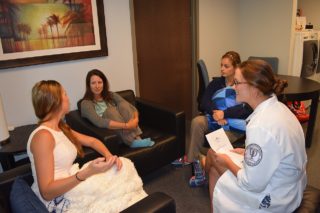Longevity Live Paid Content. People, regardless of their age and gender, face several psychiatric problems. Moreover, it would not be wrong to say that identifying a mental illness often becomes quite complicated. Common symptoms such as depression, phobia, anger, and stress fluctuate from person to person. Often, pinpointing the root cause is also challenging as both genetic and sociocultural factors play a part independently and collectively.
Consequently, the road to recovery can be a bumpy ride.
Meanwhile, to handle patients suffering from mental health issues, a psychiatric nurse needs to be empathetic and understanding. Only by doing so, some positive results come out with extensive therapy.
Treatment of psychiatric patients mainly occurs in specialized facilities and community settings and infrequently in hospitals. But the need for a psychiatric nurse is required in either environment.

patronestaff/shutterstock
If you are aspiring to become one or merely trying to understand the intricacies of a psychiatric nurse’s professional life, you’ve come to the right spot. Here are a few simple facts to make you more knowledgeable.
Their demand in the healthcare system is increasing
There is a global shortage of nurses, including psychiatric nurses. Mental health issues are becoming increasingly prevalent, especially in developing countries. Moreover, the availability of health insurance policies in developed countries has made getting psychiatric and mental health treatment less taboo and more affordable.
If you’re aspiring to become a psychiatric nurse, now is probably the right time to speed up the process. Since 2015, there has been a 17% increase in demand for psychiatric nurses, with over 12,000 job postings in 2019.
Becoming a psychiatric nurse is no walk in the park. For this, you need to meet advanced educational requirements by doing a master’s or doctoral degree. After getting this degree, you can work as a Psychiatrist Clinic Specialist or Psychiatrist Nurse Practitioner in mental health care facilities. Often, managing clinical experience and completing higher education becomes difficult for aspiring nurses. Hence, virtual degrees such as ccne accredited online msn programs help strike the perfect balance while advancing in a psychiatric nursing career.
Psychiatric nurses don’t necessarily work in hospitals and clinics
People often make a stark difference between mental and psychiatric health. While that is true to an extent, psychiatric nursing and mental health nursing both have an overlapping scope. Their roles entail providing patients with quality advice on how to improve their mental well-being. Therefore, the popular notion that a psychiatric nurse works only in psychiatric care facilities is mostly inaccurate.
Many organizations around the world prioritize employee mental health and well-being today. Naturally, happy, motivated, and mentally sound employees are more productive at the workplace and contribute significantly to business profitability. Companies pay top dollars to skilled resources who develop and implement complex employee wellness programs to ensure the workforce is mentally healthy and physically productive. According to the BLS, mental health program manager salary packages stand at a handsome $100,000 per year. Now, how’s that for a career?
Effective communication skills play a vital role in the job

Photo by cottonbro from Pexels
Whether in a clinical setup or a corporate job, psychiatric nurses deal with people from all walks of life. In fact, in addition to the patient, they also have to interact with their close ones. They monitor and address several complicated cases that need proper attention to detail and care. Hence, excellent and sharp communication skills form the crux of all their professional interactions.
The job of psychiatric nurses demands notable sensitivity and sensibility in both verbal and non-verbal communication. They need to be empathetic while dealing with patients suffering from mental illnesses and disorders. They also need to be effective in simplifying complex medical jargon while explaining treatment pathways to patients’ family members. Not to mention, miscommunication while treating neurological disorders can have fatal consequences.
Working hours are considerably more manageable in community settings
Working hours for nurses in a typical hospital setting tend to be more erratic. On top of that, understaffing requires them to work extra hours and shifts. Of course, this hectic routine has its downside, the most prominent being an inability to maintain a healthy work-life balance.
Suppose you’re aspiring to join a career in psychiatric care. In that case, it will be beneficial to know that jobs based in a community setting tend to have more predictable working hours than a hospital. These include jobs enabling you to provide services to patients in their homes, getting therapy at the clinics or mental health amenities. Most of these facilities and job roles follow the “standard” eight-hour working routine and make balancing work and life considerably easy, unlike a typical nurse’s job in a hospital.
Certification is mandatory
Generally speaking, you can’t practice nursing without relevant certifications. But it is practically impossible to work as a psychiatric nurse without accreditation and experience. With the required qualifications, you will still need;
- an active nursing license

- experience equal to two years of work as a registered nurse
- and a minimum of 2000 clinical hours in a mental health facility
Sounds overwhelming, doesn’t it? But wait, that’s not all. These requirements need to be met in less than three years before you can actually start working as a psychiatric nurse practitioner. After all, dealing with someone’s mental health is no joke, and only highly trained, and determined individuals should be allowed to.
There are different types of psychiatric nurses
The two most common types include RPNs and advanced PNPs. The main differentiating factors are the qualification and experience each has.
Registered Psychiatric Nurses perform routine tasks, such as administering medicines, monitoring symptoms, implementing health plans laid out by a psychiatrist or psychologist, etc. They work primarily in hospitals and clinics and occasionally assist doctors on house calls.
However, working as a Psychiatric Nurse Practitioner upgrades the responsibilities to diagnosing and designing treatment plans. PNPs have far greater authority. They can suggest treatments such as physiotherapy and surgery and make decisions that an RPN cannot in the absence of a psychiatrist. Not to mention, the additional knowledge, skill, and decision-making powers enable PNPs to work independently as an entrepreneur providing mental healthcare services to patients in need.
Conclusion
Undoubtedly, psychiatric nurses play a crucial role in the healthcare system. Dealing the patients with mental illnesses can be equally taxing for the person administering care. That not only requires higher education but a sensitive and empathetic heart. One needs to listen and understand their issues with tolerance and give them support, comfort, and treatment. A demanding job, indeed!




![women [longevity live]](https://longevitylive.com/wp-content/uploads/2020/01/photo-of-women-walking-down-the-street-1116984-100x100.jpg)










